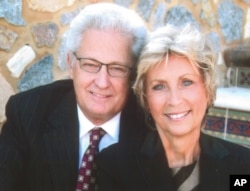Whether for-profit companies with religious objections can be forced to offer coverage for contraceptives in their insurance plans is one of the controversial cases expected to be delivered next week by the U.S. Supreme Court.
In March, the court heard arguments brought by two family-owned companies, including the arts-and-crafts chain Hobby Lobby, over a requirement in the new health care law. The new law requires that contraception be covered - unless the employer is a religious organization.
The administration has made churches and religious non-profits exempt from the "contraception mandate," but Hobby Lobby and the other company, Mennonite family-owned Conestoga Wood Specialties, contend that the Religious Freedom Restoration Act protects them as well.
The Greens, a Christian family from Oklahoma, owns Hobby Lobby, which has about 500 stores with more than 16,000 full-time employees. Forbes valued the family’s net worth at $5 billion.
Company President Steve Green argued that if Hobby Lobby’s health insurance plan provided a contraceptive that is used after intercourse – such as the so-called “morning-after pill” – the Greens would be party to an abortion.
“This is an issue of life, that we cannot be a part of taking life. And so to be in a situation where our government is telling us we have to be is incredible,” Green said in a corporate video.
The family released a video in March to explain their decision to challenge the Affordable Care Act.
“People are saying that we are taking rights away from somebody, and there's no way we are taking anybody's rights away,” company founder David Green says in the video while seated on a couch next to his wife, Barbara Green. “It's our rights that are being infringed upon to require us to do something that is against our conscience.”
Tricky legal questions
In determining the case, the Supreme Court will have to consider two tricky legal questions.
One is whether for-profit corporations have a right to religious freedom similar to what the U.S. Constitution gives to citizens.
The other is, even if that’s not the case, whether business owners’ religious rights come before those of their employees.
Polls show that while the overwhelming majority of Americans favor contraceptive coverage, many think business owners who have moral objections should not be forced to provide it.
A Hobby Lobby and Conestoga victory could have wide-ranging implications, and may even give license to discrimination, said Caroline Frederickson of the left-leaning American Constitution Society.
A ruling the other way, however, could clear the way for restrictions on religious practice. The example given is a ban on kosher and halal slaughter, as some European countries have instituted, said Lori Windham of the Becket Fund for Religious Liberty, which is representing Hobby Lobby.
Experts say the controversy is particular to America’s system of employer-provided health insurance, and would not be an issue for business owners in a single-payer system in which the state provides health care services.
The other cases expected to be delivered Thursday include abortion clinic buffer zones, presidential recess appointments and labor union rights.
Jerome Socolovsky contributed to this report from Washington. Some information for this report provided by Reuters.
In March, the court heard arguments brought by two family-owned companies, including the arts-and-crafts chain Hobby Lobby, over a requirement in the new health care law. The new law requires that contraception be covered - unless the employer is a religious organization.
The administration has made churches and religious non-profits exempt from the "contraception mandate," but Hobby Lobby and the other company, Mennonite family-owned Conestoga Wood Specialties, contend that the Religious Freedom Restoration Act protects them as well.
The Greens, a Christian family from Oklahoma, owns Hobby Lobby, which has about 500 stores with more than 16,000 full-time employees. Forbes valued the family’s net worth at $5 billion.
Company President Steve Green argued that if Hobby Lobby’s health insurance plan provided a contraceptive that is used after intercourse – such as the so-called “morning-after pill” – the Greens would be party to an abortion.
“This is an issue of life, that we cannot be a part of taking life. And so to be in a situation where our government is telling us we have to be is incredible,” Green said in a corporate video.
The family released a video in March to explain their decision to challenge the Affordable Care Act.
“People are saying that we are taking rights away from somebody, and there's no way we are taking anybody's rights away,” company founder David Green says in the video while seated on a couch next to his wife, Barbara Green. “It's our rights that are being infringed upon to require us to do something that is against our conscience.”
Tricky legal questions
In determining the case, the Supreme Court will have to consider two tricky legal questions.
One is whether for-profit corporations have a right to religious freedom similar to what the U.S. Constitution gives to citizens.
The other is, even if that’s not the case, whether business owners’ religious rights come before those of their employees.
Polls show that while the overwhelming majority of Americans favor contraceptive coverage, many think business owners who have moral objections should not be forced to provide it.
A Hobby Lobby and Conestoga victory could have wide-ranging implications, and may even give license to discrimination, said Caroline Frederickson of the left-leaning American Constitution Society.
A ruling the other way, however, could clear the way for restrictions on religious practice. The example given is a ban on kosher and halal slaughter, as some European countries have instituted, said Lori Windham of the Becket Fund for Religious Liberty, which is representing Hobby Lobby.
Experts say the controversy is particular to America’s system of employer-provided health insurance, and would not be an issue for business owners in a single-payer system in which the state provides health care services.
The other cases expected to be delivered Thursday include abortion clinic buffer zones, presidential recess appointments and labor union rights.
Jerome Socolovsky contributed to this report from Washington. Some information for this report provided by Reuters.






